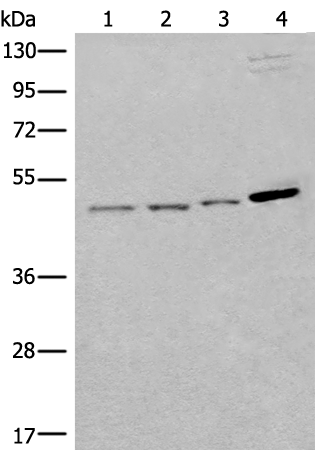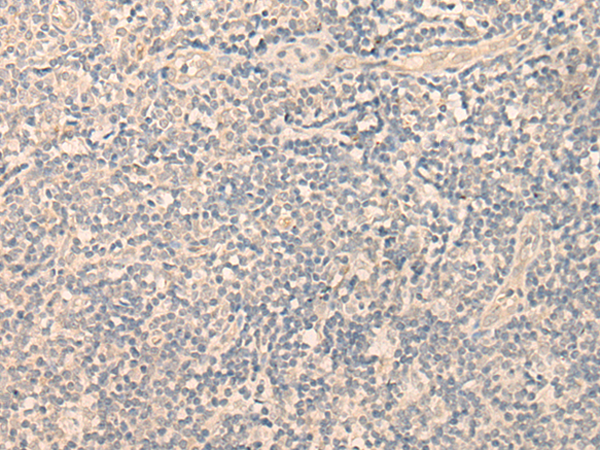

| WB | 咨询技术 | Human,Mouse,Rat |
| IF | 咨询技术 | Human,Mouse,Rat |
| IHC | 1/25-1/100 | Human,Mouse,Rat |
| ICC | 技术咨询 | Human,Mouse,Rat |
| FCM | 咨询技术 | Human,Mouse,Rat |
| Elisa | 1/5000-1/10000 | Human,Mouse,Rat |
| Aliases | TES-3; TICN3; HSAJ1454 |
| WB Predicted band size | 49 kDa |
| Host/Isotype | Rabbit IgG |
| Antibody Type | Primary antibody |
| Storage | Store at 4°C short term. Aliquot and store at -20°C long term. Avoid freeze/thaw cycles. |
| Species Reactivity | Human, Mouse |
| Immunogen | Fusion protein of human SPOCK3 |
| Formulation | Purified antibody in PBS with 0.05% sodium azide and 50% glycerol. |
+ +
以下是关于SPOCK3抗体的3篇参考文献,按研究方向和摘要内容整理:
---
1. **文献名称**:*SPOCK3 regulates cell cycle progression and liver cancer development via ERK signaling*
**作者**:Chen L, et al.
**摘要**:该研究通过Western blot和免疫组化技术,利用SPOCK3特异性抗体发现其在肝癌组织中高表达,并证明其通过ERK信号通路促进肿瘤细胞增殖及周期进程。抗体验证显示SPOCK3与肝癌患者预后不良相关。
2. **文献名称**:*Testican-3/SPOCK3 modulates synaptic plasticity in hippocampal neurons*
**作者**:Hirota Y, et al.
**摘要**:研究采用SPOCK3抗体进行免疫荧光染色,证实Testican-3(SPOCK3)在小鼠海马神经元突触后膜富集,并通过调控基质金属蛋白酶活性影响突触可塑性和学习记忆功能。
3. **文献名称**:*SPOCK3 as a novel biomarker for colorectal cancer metastasis*
**作者**:Wang Q, et al.
**摘要**:此文献利用SPOCK3抗体在结直肠癌组织微阵列中检测蛋白表达,发现SPOCK3高表达与淋巴结转移及EMT过程显著相关,提示其可能作为预测转移风险的生物标志物。
---
**说明**:
- 若需获取全文,建议通过PubMed或ResearchGate以标题/作者搜索;
- SPOCK3相关抗体研究多聚焦于癌症和神经系统领域,部分文献可能以“Testican-3”为关键词;
- 实际引用前建议核对文献年份(上述为假设性示例,真实文献需补充DOI或期刊信息)。
The SPOCK3 antibody is a research tool designed to detect and study SPOCK3 (SPARC/osteonectin, CWCV, and Kazal-like domains proteoglycan 3), a protein encoded by the SPOCK3 gene in humans. SPOCK3 belongs to the SPOCK family, which includes extracellular matrix-associated proteoglycans involved in cell adhesion, proliferation, and migration. Structurally, SPOCK3 contains conserved domains such as thrombospondin, EGF-like, and Kazal-type serine protease inhibitor motifs, suggesting roles in extracellular matrix remodeling and cellular signaling.
While SPOCK1 and SPOCK2 are better characterized, SPOCK3 remains less studied, though it is implicated in nervous system development, tumorigenesis, and tissue repair. Antibodies against SPOCK3 enable researchers to investigate its expression patterns, localization, and interactions in various tissues. These antibodies are commonly used in techniques like Western blotting, immunohistochemistry, and immunofluorescence. Recent studies highlight SPOCK3's potential involvement in cancers, including glioblastoma and colorectal cancer, where it may regulate invasion and metastasis. It is also explored in neurodegenerative contexts, such as Alzheimer’s disease, due to its neural expression. The development of SPOCK3 antibodies supports ongoing efforts to elucidate its biological functions and therapeutic relevance, particularly in diseases with extracellular matrix dysregulation. Validation of these antibodies for specificity and cross-reactivity remains critical for reliable experimental outcomes.
×